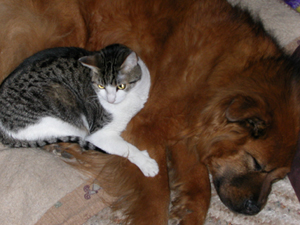Next week, March 17th – 23rd, is National Poison Prevention Week. We want to remind everyone to keep phone numbers for your regular veterinarian, your closest emergency veterinary clinic or hospital and the ASPCA Poison Control Center (888-426-4435) on your refrigerator, kitchen bulletin board or wherever you keep emergency numbers handy for your family. When you are in the midst of something urgent, you will not want to or may not have time to search for the information.

It’s an excellent idea to program those numbers into every family member’s cell phone, with easy to remember speed-dial numbers attached. Use the same speed-dial numbers on all phones in the household.
That way, if you are not at home and your son or daughter, husband or wife, sister or brother has a pet emergency and they call you in a panic, you can remind them the phone numbers are in their cell phone under “Vet”, “Emergency Vet” and “Pet Poison Control”. Or quickly tell them what speed-dial number to call.
Dr. Frank also recommends reading the information written by Dr. Marty Becker on poison prevention for pets. In this article Dr. Becker talks about common household substances that pet owners often do not realize are harmful to their pets.
Dr. Becker wrote, “…While some pet poisonings are a result of something an animal gets into that is a known poison, like a rodenticide, a surprising number of cases come from something intentionally given to an animal by an owner who’s trying to help.
The classic example of the latter is when an elderly cat is given an extra-strength acetaminophen for arthritis. The owner is trying to help, but unfortunately even one capsule of this common human medicine can kill a cat. As for dogs, they can figure out their way into trouble that their owners never envisioned. A few months ago, our neighbors dog answered the question “can dogs eat almonds” with a resounding no of puking all over the carpet. Not to mention, dog ownership difficulties also include opening cabinets to get cleaning products and counter-surfing to reach food items and pill vials.
Take preventive measures. You need to realize that pets are basically like toddlers who can open any childproof container that is not locked up or hidden away, and you should take similar precautions to keep your pets safe and healthy.
- Keep products such as medications, harmful foods and cleaning products in a secure cabinet above countertop height.
- Use a kitchen garbage can with a lid.
- Always read labels, especially on flea and tick products, and on lawn and garden products. Store out of reach in a high cupboard, not under the sink.
- Be familiar with the plants in and around your home, and have only nontoxic plants.
- Never give any medication or supplement to your pet unless recommended or approved by your veterinarian. According to the Pharr Road Animal Hospital, many toxic substances aren’t well-known to dog owners. For example, don’t let your dog have significant amounts of raisins or grapes, macadamia nuts, moldy cheese, chocolate, onions, garlic or xylitol-sweetened gum and other candies or baked items.
Recognize the symptoms. Even with preventive measures in place, it is important to know the signs of poisoning. Many (but not all) substances first cause stomach upset, including vomiting and diarrhea. It’s not fun, but vomit must be examined for evidence of chewed packaging, plants, food, pills or other important clues. Many poisonings progress to weakness and depression or nervous stimulation, including tremors and seizures. Pets may stop eating and drinking, or may drink excessive amounts, which could suggest liver or kidney involvement. Rapid or slow breathing, with changes in tongue and gum color — from pink to white, blue or brown — is important.
Get help, fast. If you suspect poisoning, stay calm. Panicking will not help your pet and may waste precious time. If your pet is not showing any serious signs of illness described above, contact your regular veterinarian or the ASPCA Animal Poison Control Center (888-426-4435) to determine if your pet needs to be seen by a vet or if treatment can be given at home.”
If your pet is having difficulty breathing, having seizures, or is bleeding or unconscious, go to your regular veterinarian or emergency clinic immediately. Take any evidence, including chewed containers and labels, and even vomit. This information is key to helping your veterinarian save your pet. Be sure you always have the numbers of your pet’s regular veterinarian, your local veterinary emergency clinic and the ASPCA Animal Poison Control Center in an easily accessible location. It could save your pet’s life.”
The above quoted information is from a January, 2012 article by Dr. Becker posted on the VetStreet website.
Additional Resources:
Dr. Frank talks about specific foods and other items to pay attention to in previous posts
Pets and the Holidays
Thanksgiving Tip for your Cats and Dogs
Reminder +
